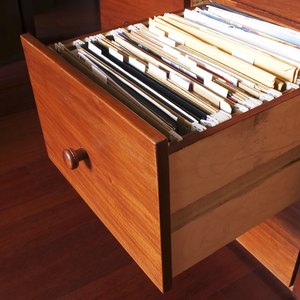
Although the Internal Revenue Service recommends keeping tax records for three years, you should keep documents pertaining to rental property longer. Besides tracking your rental income and expenses, you need to keep records that back up deductions or credits you claim on your federal tax return. You also want to keep documents that can help protect you from landlord-tenant litigation.
Tips
Rental property owners should keep tax records on their investment properties typically for at least seven years.
Keeping Federal Tax Returns
While the IRS can audit a tax return for up to seven years after you file, generally, you no longer have to worry about being audited after three years. But if the IRS thinks you under-reported your income, it has the right to extend the three-year deadline by three more years. Writing off a bad debt allows the IRS to go back seven years, which is the statute of limitations for claiming a credit or refund for bad debts. Even when the audit deadline for a return has passed, keeping your tax returns indefinitely provides you with information relating to your assets that you might need in the future.
Saving Paperwork as Proof
It's important to keep all financial records relating to your rental activities. If you are audited, you must show proof for any deductions you claim. You can scan and store records electronically, keeping cancelled checks, credit card receipts, a record of rent payments, utility bills, bank statements, year-end loan summaries, and insurance receipts. If you own more than one rental property keep separate records for each. Property management companies should keep audit reports by certified public accountants and legal documents indefinitely.
Maintaining Records Showing Landlord-Tenant Relationship
Always keep any records that potentially affect your tax returns, which include your landlord-tenant relationship, for seven years, advises the American Bar Association. That includes keeping signed lease agreements, tenant applications, and inquiries that provide information about prospective tenants. Keep all applications, including those that you rejected or tenants withdrew.
The length of time you need to keep the documents depends on current federal and state law. Keeping tenant rental agreements beyond the point when the statute of limitations expires offers you additional protection should a previous tenant file a lawsuit against you. Although landlord and tenant laws or statutes vary by state, you need to be able to show documentation that you have not violated any fair housing laws.
Deciding What Paperwork Can Go
Back up key documents on thumb drives and store them in a safe deposit box or use an online document storage service. Once you reconcile bank deposit receipts with your bank statements, you can shred the deposit slips. While you can get rid of expired warranties, you should keep the sales receipt for the life of a warranty.
Hold on to old insurance policies for three years even if you no longer deal with that insurer. For minor repairs and capital improvements you make to a rental unit, keep the sales receipts until you sell the property. File receipts for large purchases, such as appliances you supply, with your insurance inventory checklist.
References
Writer Bio
Amber Keefer has more than 25 years of experience working in the fields of human services and health care administration. Writing professionally since 1997, she has written articles covering business and finance, health, fitness, parenting and senior living issues for both print and online publications. Keefer holds a B.A. from Bloomsburg University of Pennsylvania and an M.B.A. in health care management from Baker College.

